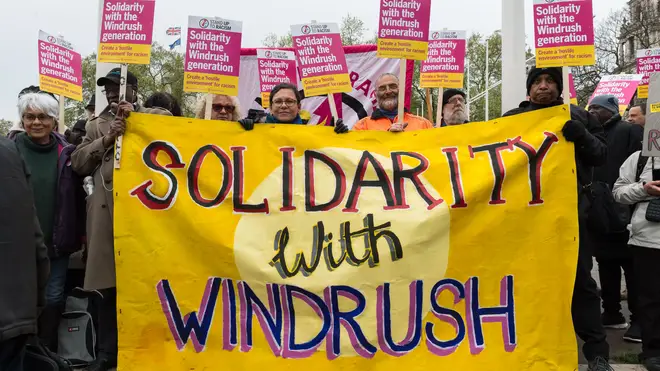What is Windrush Day, when is it marked and who are the Windrush generation?
21 June 2024, 15:38

Windrush Day falls on 22nd June, and honours the British Caribbean community and their contribution to rebuilding and reshaping the UK after the Second World War.
Since 2018, the UK has celebrated Windrush Day on 22nd June.
Windrush Day honours the British Caribbean community, and celebrates those people who came to the UK from the late 1940s and onwards to help rebuild the country after the Second World War.
Here's everything you need to know:

What is Windrush Day and when is it?
Windrush Day is an annual event marked on 22nd June.
The day has been created in tribute to the people from the Caribbean who traveled to Britain to help rebuild it after the Second World War.
Seventy-two years ago, a ship called the Empire Windrush London docked in England, carrying 600 hundred people who were invited to move to Britain following WW2.
However, when they arrived in the UK, they suffered extreme prejudice and racism.

Who is the Windrush Generation?
The Windrush Generation are those half a million people who arrived in the UK between 1948 and 1971 for work and to help rebuild Britain.
The name Windrush comes from the name of the first ship that transported people to Britain, the Empire Windrush London.
At this time, in 1948, all Commonwealth citizens were British citizens and by 1971, the Immigration Act gave all Commonwealth citizens the right to remain in the UK.
However, the Home Office failed to issue people with paperwork, and did not keep a record of the people who stayed in the UK.
In 2023, the 75th anniversary of the arrival of the HMT Windrush was celebrated across the United Kingdom with concerts, exhibitions and seminars.
King Charles III held a reception at Buckingham Palace for the anniversary, where he called the Windrush Generation a "profound and permanent contribution to British life".

What is the Windrush scandal?
In 2012, the Government put into place the Hostile Environment Policy, which made life very difficult for the Windrush Generation. The policy meant that without proper ID checks, people could not access the NHS, sign contracts with landlords, or banks – even though they were British citizens.
In 2013, people from the generation received letters telling them they had no right to be in the UK, subsequently causing people to lose their jobs, their homes and access to the NHS, while others were placed in immigration detention or deported.
In order to prove they were living in the UK legally, those people from the Windrush Generation had to provide one document from each year they have been in Britain. For many, who were just children when they came to the country, this was an impossible feat.
After 140 MPs urged Theresa May to change the policies, the Government made a U-turn. The then-Prime Minister apologised to the leaders of the Commonwealth, and the Immigration Minister, Caroline Nokes admitted terrible mistakes had been made.

In March 2020, an inquiry carried out found that the scandal was not only "foreseeable" but also "avoidable" and criticised the Home Office for "a culture of disbelief and carelessness".
The inquiry published 30 recommendations off the back of the findings, which included a full Home Office review of the UK's "hostile environment" immigration policy, appointing a migrants' commissioner and establishing a race advisory board. At the time, the then-Home Secretary Priti Patel accepted the recommendations.
However, in January 2023, the Home Secretary at the time, Suella Braverman, announced that they would be dropping three of the recommendations made by the inquiry. They were; to appoint a migrants' commissioner responsible for "speaking up for migrants and those affected by the system directly or indirectly," giving the independent chief inspector of borders and immigration new powers and holding events with people affected to "listen and reflect on their stories".
In April 2019, the Windrush Compensation Scheme was set up to repair the troubles caused by the scandal, however, it has been criticised for delays in processing applications, paying out low offers and rejections which were later reversed on appeal.
The Home Office has since said it was "committed to righting the wrongs of Windrush," while the government added that it would ensure "similar injustices can never be repeated and [was] creating a Home Office worthy of every community it serves".
According to the Home Office, as of February 2024, the scheme has paid over £83.8m across 2,307 claims.























